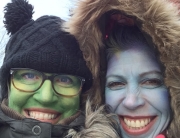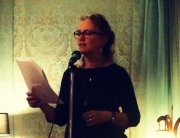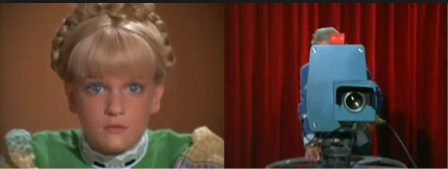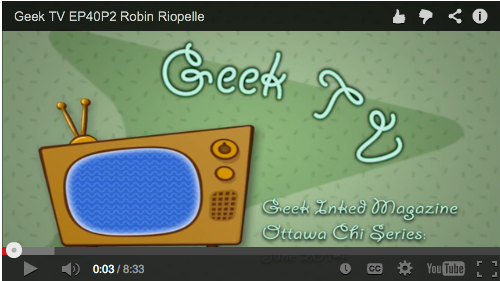It’s a literary chain letter. Or an author-y ice bucket challenge (except without the donation or the ice). The Canadian Writers Blog Tour has officially touched down in my backyard, and I have Ranylt Richildis to thank for it.
Thanks, Ranylt.
Ranylt also wrote a whiz-bang response to the four questions I will attempt to answer below, and therefore tainted the meat I am about to carve. Her answers are deliriously spot-on. My answers are neither whiz-bang nor spot-on, but they do allow me the dubious honour of nominating another writer of note, below.
What are you currently working on?
This question might be better put, “what am I not working on?” because, honestly, I’ve perfected the art of not-working on writing for the past month or so. The adage, “a writer writes” is just fine for some, but competing interests and demands can sap the willpower. It’s just too hard to put finger-pads to keyboard at the end of a grueling day of writing for Those Who Pay the Bills. But as to what I’ve not been working on, it’s a bit of a departure from Deadroads (which is a ghost story set in contemporary Nebraska), and return to earlier writing that skewed to the historical-fantastical. But with student politics and an election. Okay, there are ghosts, too.
I am neck-deep in research at the moment, diving into riveting stuff about colonial ghost stories, Confederation, and the political culture of early 19th century universities. Uhm, yeah, I’m putting “Confederation” and dark fantasy together in the same book. Like Pierre Berton bumping into Guy Gavriel Kay at a frat kegger.
How does your work differ from others?
So, you read above about the Berton/Kay/kegger, right? Like that. That’s how my work is a little to one side of normal.
“Genre” fiction is really fragmenting at the moment. Scratch that. Fragmenting, or splintering, sounds negative and not a little bloody. Rather, genre is going off-script. It’s not behaving like “normal” genre anymore. I don’t know how many writers, myself included, describe their work as “between genres”. I honestly think most work produced today—or at least, work I like to read—is difficult to place on traditional shelves.
I’m particularly interested in the sweet spot between family drama, political commentary, and dark fantasy. I love words in all their prettiness and horror. I love a bone-deep sense of place. What I don’t concentrate on quite so much are tricky twists or high concepts. I don’t have driving narratives leaping pell-mell into the fray. My stories tend to be atmospheric and character-rich, with just the barest of dark, speculative touches.
Why do you write what you do?
My esteemed colleague and tagger-of-note, Ranylt Richildis, answered this question so adroitly that I’m just going to go ahead and quote her verbatim: “I write what I want to read … I still have to write in the voice that comes out of me at the end of the day, whether it results in legacy or not. Writing has always been instinctive, exorcising. It’s my idea of fun even when it isn’t fun.”
I long to be “in the zone.” Writers, you know what I’m talking about. When all you think and feel and want is your story. You long to be with your characters, and their voices speak through your fingertips. When the writing is absolutely effortless. That’s the best place to be, and all the countless hours of bitching and moaning are worth it for a few short hours of that.
How does your process work?
Assuming I have a process, you mean.
Generally, I look for confluences, when [insert-magic-number here] small topics or ideas snag my attention, like so many fishes gathered in a net. A documentary about Palestinian refugees. The 1837 prison portraits of French-Canadian rebels. Finding out monks are buried in the quadrangle of Trinity College. The saucy tour guide providing such startling information. Research ideas, provocative images, amazing anecdotes, and half-characters begin to stack up. They start talking to each other, they begin to make sense together. They generate their own energy.
I research the shit out of things. I love it. I research, I plot, I outline. I do a ton of work prior to writing. And I don’t start writing until I know exactly where I’m going.
When do I know it’s time for research to end? When I’m in a lather, when I’m insane with wanting to write.
I wish I could say that I devote three hours every morning to writing, or a full day on Sundays, or at the very least, commit to producing 1000 words a day. I don’t. I can’t. But waiting for the muse to strike isn’t an option, either. I have a very busy life between work and family, but more and more I’m learning to actually carve out time during the day to write for myself. I write for others as a day job—so first and foremost, fiction writing has to be for me, otherwise I’d put it off as just another chore.
__________
I am very, very pleased to virtually tag my neighbour, friend, and SFWA representative, Matthew Johnson. He of Irregular Verbs fame. Author of many fine short stories, published in Asimov’s, Strange Horizons, and The Magazine of Fantasy & Science Fiction (among others!). The still water that runs deep. My conduit for all things science fiction, fantasy, and (of course) anything to do with the pedagogy of media.







Leave A Comment